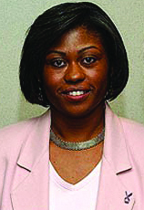December 16, 2010
 Tina Chery
Tina Chery
Editor's Note: This article is part of a larger series of stories that was published in the Dec. 16, 2010 edition of the Dorchester Reporter.
At 15, Louis David Brown had great plans for his life, including going to college, becoming an engineer and maybe one day being elected President. But a gunfight on Geneva Avenue shattered those plans in 1993 when a stray bullet ended Brown’s life. While Brown’s dreams died that day, they inspired a vision for his mother, Tina Chery - for a city in which no other mother had to bury her son, one in which young adults put down their weapons and negotiated for peace.
Seventeen years later, Chery serves as founder and President of the Louis D. Brown Peace Institute, a Field’s Corner-based nonprofit that she hopes can turn the next generation into what she calls “ambassadors for peace.”
Chery and her team engage the community through schools, public events and street-level campaign work to remind those willing to turn to violence that their actions reach far beyond their enemies, that by participating in a culture of violence they are preventing their communities from reaching their full potential.
While much of the Peace Institute’s mission is based on educating adults and children about how to break the cycle of violence and rivalries that at its height in the nineties claimed more than one hundred lives annually, much of Chery’s work centers on families struggling with losses similar to her own.
Because most violence prevention work is done at the local level with multiple organizations working to cover a given area, Chery says there is little continuity from case to case. Due the lack of coordination means some families see a wealth of assistance while others are left wanting.
In part from Chery’s urging, the Suffolk County District Attorney’s office in recent years has composed a guidebook to help highlight services available to families of murder victims. However, Chery believes that many of these crimes can be avoided if a more proactive approach is taken, targeting the children and relatives of people arrested for violent crime and those returning from prison only to find there is no solid ground for them to rebuild their lives.
Chery also says that there is a hesitancy in many organizations to offer help to the friends and families of violent criminals. While she believes the justice system should be allowed to prosecute individuals for violent acts, she says families preparing to send a loved one to prison find themselves in a similar situation to the families of victims, but rarely receive the help they need to prevent future crimes.
Before another violence intervention program opens its doors, Chery says, the City of Boston needs to better understand who needs help and what work still needs to be done.
“The city of Boston should never want for anything because we have everything we need,” Chery said. “But until we step back and realize what we have, there will always be missed opportunities.”
In the years since Brown’s death, Chery has helped guide hundreds of families in Dorchester, Roxbury and Mattapan through the grieving process as they lay their loved ones to rest, sharing in their pain but also assuring them that the best way to remember their son or daughter is to resist turning to violence themselves in hopes revenge will bring closure.
Chery’s work is exhausting, as she moves from one grieving family to another, but she says that until the City of Boston and organizations similar to her own can come together to create a comprehensive violence-mitigation plan, the flow of families will never end.
“We need to step back and take an inventory of what we are all doing,” Chery said. “All of these groups are competing for funding, for turf, we’re modeling exactly what we tell people not to do.”



